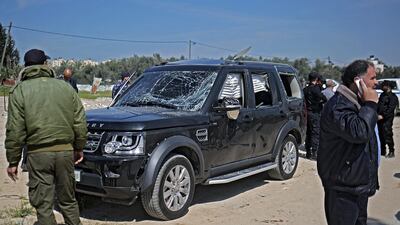Hamas closed the offices of a Qatari telecommunications company in the Gaza Strip for failing to co-operate in an investigation into the apparent assassination attempt against Palestinian Prime Minister Rami Hamdallah.
Mr Hamdallah, who is based in the occupied West Bank, survived the roadside bomb that blew up near his motorcade during a rare visit to the Hamas-held Gaza Strip.
Hamas police spokesman Ayman Batniji said in a statement on Saturday that Wataniya Mobile – a subsidiary of Qatar’s Ooredoo – was being shut down for “refusing to co-operate” in the probe.
The statement did not provide further details, and there was no immediate response from the telecommunications firm.
Gaza's international security forces chief Toufik Abou Naim said the decision was taken by the prosecution, reported pan-Arab daily Asharq Al Awsat.
The report quoted Mr Naim as saying that the telecommunications company refused to comply with the prosecutor’s order to disclose data and the names of suspects.
Read more: Palestinian prime minister survives Gaza roadside bomb attack
There has been no claim of responsibility for the bomb attack, but Hamas has made a number of arrests.
Mr Hamdallah leads the government in the occupied West Bank, while Hamas heads a rival administration in Gaza. Tuesday’s attack further complicated an already faltering reconciliation between Hamas and Palestinian President Mahmoud Abbas’s Fatah party.
Mr Abbas said after the attack he held Hamas responsible since it is in charge of security in Gaza, but he did not accuse the group of directly carrying out the bombing.
Hamas in turn blamed Israel, which has assassinated several Palestinian leaders over the years.
Meanwhile, Dr Anwar Gargash, UAE’s Minister of State for Foreign Affairs, criticised Qatar for its continued efforts to support extremist groups.
He said on Sunday that evidence shows that Doha has given money to terrorist organisations.
“The New York Times article, and months before that, the Financial Times article on Qatar paying a ransom to the Popular Mobilisation Units, Al Nusra and other terrorist groups solidify the procedures taken against extremism and terrorism and show that these are the issues at the core of the crisis,” Dr Gargash said on Twitter.
“From $700 million to $1 billion that the Qatari government paid to terrorist groups, including Hezbollah, the Popular Mobilisation Units and Al Nusra, it is impossible for Doha to deny [it happened] in light of the accumulating evidence. Supporting extremism and terrorism is the problem.”
Saudi Arabia, the UAE, Bahrain and Egypt cut all ties with Doha last year over its support of extremists.
The four Arab countries stand firm by their decision to boycott Qatar, saying they are willing to re-establish communications with Doha only if it adheres to regional and international agreements and the demands and principles they have issued.
Doha has so far refused to meet the quartet's 13 demands – including the closure of Qatar-owned Al Jazeera news channel, which the quartet says provides a platform for extremists and dissidents.

